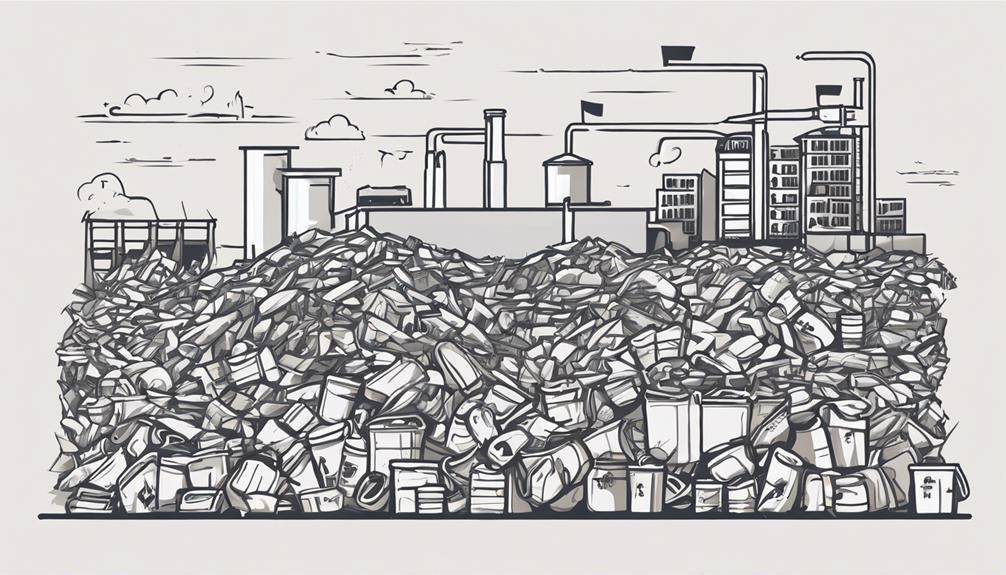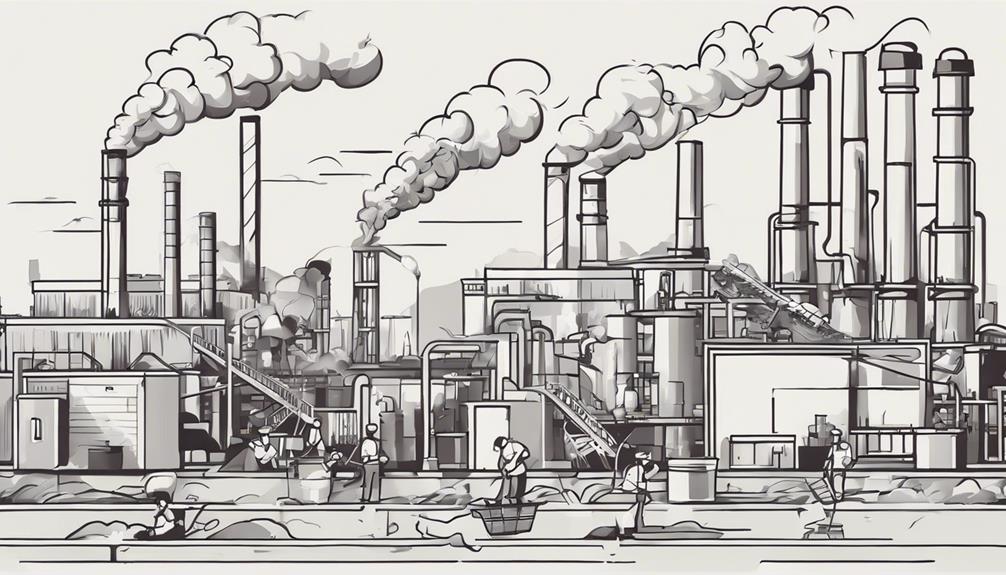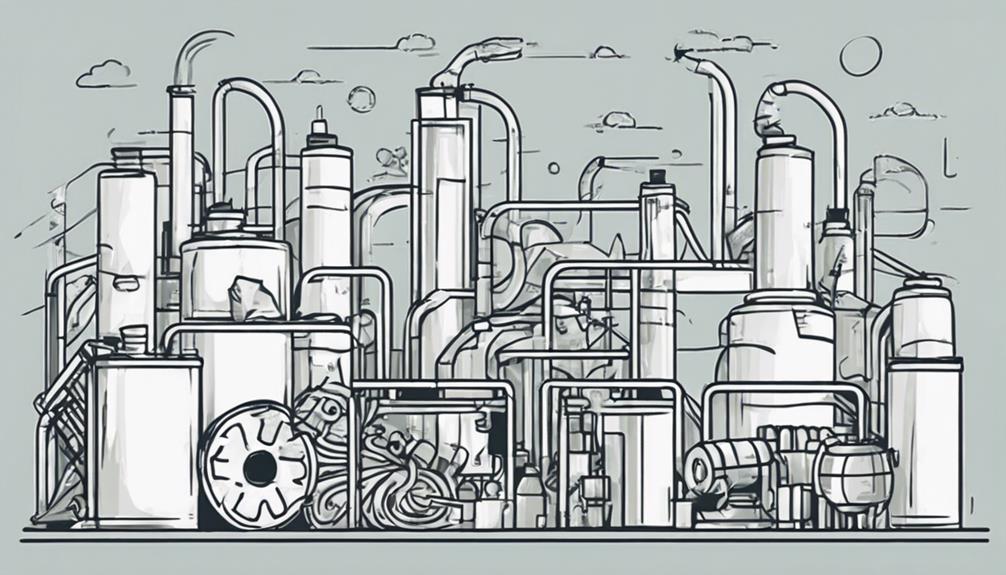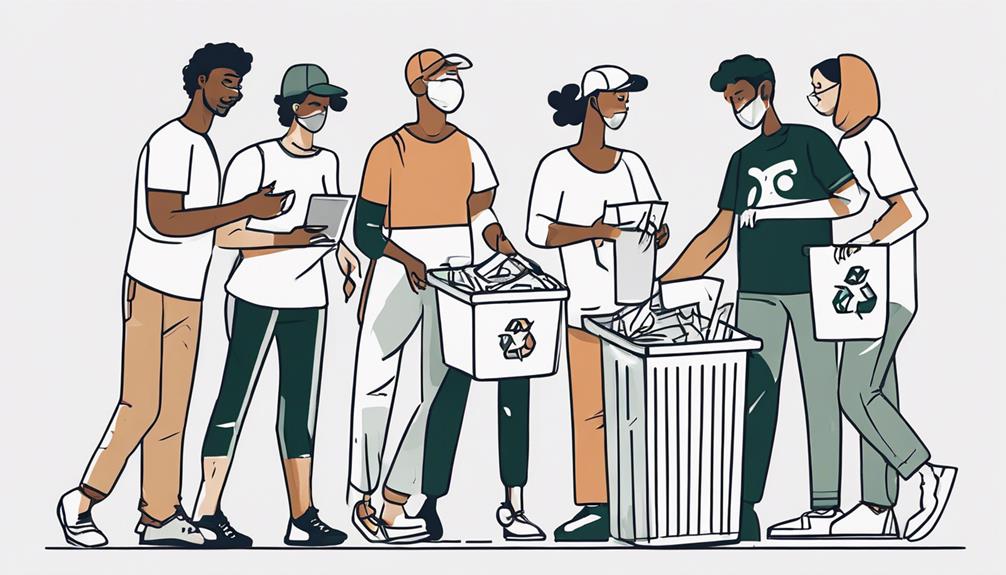The significance of recycling transcends mere waste management; it intertwines with the very fabric of sustaining our planet's delicate ecosystem. By participating in recycling practices, individuals are not only making a personal contribution but are actively engaging in a global movement towards environmental preservation. The impact of recycling goes beyond the simple act of sorting materials; it resonates with the core principles of responsible consumption and long-term sustainability. As we delve into the depths of why recycling is important, we uncover a web of interconnected benefits that extend far beyond our immediate surroundings, prompting us to reconsider our role in shaping a greener future.
Key Takeaways
- Recycling safeguards ecosystems and conserves natural resources.
- It reduces waste sent to landfills, saves energy, and lowers pollution.
- Recycling generates revenue, creates jobs, and stimulates economic growth.
- Global recycling efforts combat climate change, promote sustainability, and drive innovation.
Environmental Benefits of Recycling

Recycling offers essential environmental benefits by safeguarding ecosystems, conserving natural resources, and mitigating climate change through reduced energy consumption. By reducing the need for extracting raw materials, recycling plays a crucial role in protecting the environment and wildlife habitats. The conservation of natural resources such as timber, water, and minerals through recycling practices contributes significantly to maintaining a sustainable environment for future generations. Furthermore, recycling helps lower carbon emissions, combatting climate change by decreasing energy usage in the production of goods.
In addition to these benefits, recycling also plays a vital role in reducing waste that would otherwise end up in landfills or incinerators, thereby minimizing pollution. The preservation of ecosystems is another critical aspect of recycling, as it helps in maintaining biodiversity and ecological balance. Overall, the practice of recycling is instrumental in promoting a healthier planet and fostering environmental sustainability by conserving resources, reducing waste, lowering carbon emissions, and preserving ecosystems.
Resource Conservation Through Recycling
Through the sustainable practice of recycling, valuable natural resources such as forests and trees are conserved by reusing materials like paper. By utilizing recycled materials, the need to harvest new resources is reduced, thus conserving natural habitats and ecosystems. This conservation effort extends to reducing the demand for raw materials, which helps protect wildlife and biodiversity. Moreover, recycling plays a crucial role in enhancing energy efficiency and lowering overall energy consumption. The process of recycling requires less energy compared to producing goods from raw materials, resulting in decreased greenhouse gas emissions and a smaller carbon footprint. By promoting resource conservation through recycling, we not only mitigate the depletion of forests and other natural resources but also contribute to safeguarding ecosystems and the species that rely on them for survival. Prioritizing the use of recycled materials is essential for sustainable development and ensuring the long-term health of our planet.
Role of Recycling in Waste Reduction

Playing a pivotal role in minimizing the environmental impact of waste disposal, recycling serves as a fundamental strategy for waste reduction and resource preservation.
Key Points:
- Reduction of Waste: Recycling significantly reduces the amount of waste sent to landfills, as evidenced by over 27 million tonnes of household waste collected by local authorities in 2008-09.
- Carbon Emissions: In 2008, 37% of household waste was recycled or composted, leading to savings of CO2 emissions equivalent to nearly a million flights from London to Sydney, highlighting the role of recycling in reducing carbon emissions.
- Energy Efficiency: Recycling cans consumes up to 95% less energy compared to producing new cans from raw materials, emphasizing the energy efficiency benefits of recycling.
- Environmental Protection: Recycling plays a vital role in reducing air and water pollution associated with extracting raw materials, underscoring its importance in waste reduction and environmental protection.
These points underscore the significant impact of recycling efforts in promoting waste reduction, energy efficiency, and environmental sustainability.
Energy Savings From Recycling
In the realm of waste management and resource conservation, the substantial energy savings derived from recycling various materials underscore the critical role of sustainable practices in promoting environmental efficiency and reducing carbon footprints. Recycling aluminum, for instance, saves a remarkable 95% of the energy required to produce new aluminum from raw materials. Similarly, recycling one ton of plastic results in energy savings equivalent to 5,774 kWh. Paper recycling is also significant, saving 65% of the energy needed to produce new paper. Glass recycling conserves 30% of the energy utilized in glass manufacturing processes, while recycling steel helps conserve 56% of the energy typically used in creating steel from raw materials. These statistics highlight the immense energy savings that can be achieved through recycling different materials, emphasizing the importance of incorporating recycling practices into waste management strategies to reduce energy consumption and environmental impact.
Economic Advantages of Recycling

Recycling offers significant economic advantages through cost savings, job creation opportunities, and resource conservation benefits. The creation of jobs and revenue streams from recycling activities not only stimulates economic growth but also fosters sustainability. Additionally, recycling plays a key role in conserving valuable resources, contributing to long-term economic viability.
Cost Savings From Recycling
The economic advantages of recycling, particularly in the realm of cost savings, are evident through the reduced expenses municipalities and businesses incur on waste disposal compared to traditional methods like landfilling or incineration. Recycling offers numerous financial benefits, including:
- Reduced Waste Disposal Costs: Recycling is often a cheaper alternative to landfilling or incineration, leading to significant cost savings.
- Revenue Generation: Selling recyclable materials such as paper, plastics, and metals generates additional income for businesses and municipalities.
- Job Creation: Recycling industries create over 1.1 million jobs and contribute $236 billion annually to the economy, benefiting local communities.
- Diverting from Costly Disposal Methods: By diverting materials from expensive waste disposal methods, recycling helps alleviate financial strains on waste management systems.
Job Creation Opportunities
Job creation opportunities in the recycling industry play a pivotal role in fostering sustainable economic development and bolstering employment prospects. Recycling creates 1.1 million jobs and generates $236 billion in gross annual sales in the United States. California's recycling goal aims to create 45,000 new jobs in the recycling industry, showcasing the significant potential for job growth within this sector. Massachusetts currently employs over 9,000 individuals in various recycling enterprises, highlighting the existing job opportunities present in the state. By promoting recycling over incineration and landfilling practices, economies can benefit from the economic advantages of recycling, including sustainable economic development and increased job growth opportunities.
| Key Points | Facts |
|---|---|
| Recycling Jobs in the U.S. | 1.1 million jobs, $236 billion in sales |
| California's Recycling Goal | 45,000 new jobs |
| Massachusetts Recycling Employment | Over 9,000 jobs |
Resource Conservation Benefits
In the realm of sustainable economic practices, the emphasis on resource conservation through recycling offers a multitude of economic advantages that extend beyond mere cost savings and efficiency improvements. When it comes to resource conservation benefits of recycling:
- Conserving Natural Resources: Recycling helps save resources such as timber and minerals, reducing the need for extracting raw materials and preserving forests.
- Reduced Energy Consumption: By recycling, energy consumption is minimized, leading to lower power usage in manufacturing processes and enhancing overall energy efficiency.
- Decrease in Solid Waste Accumulation: Recycling aids in reducing solid waste accumulation, particularly from materials like plastic, promoting a cleaner environment and sustainable waste management practices.
- Promoting Sustainable Economy: It decreases reliance on fossil fuels, conserves scarce resources, and contributes to a more sustainable economy by fostering resource conservation practices.
Promoting Circular Economy With Recycling

Recycling plays a crucial role in promoting a circular economy by conserving resources, reducing waste, and fostering a sustainable material loop. By reintroducing materials into the production cycle, recycling helps minimize the extraction of raw resources and supports the concept of maximizing the value of products and materials in circulation. Embracing recycling as a means to promote a circular economy not only reduces environmental impacts but also opens up new economic opportunities while contributing to a more sustainable future.
Resource Conservation Through Recycling
Resource conservation is significantly enhanced through the implementation of recycling practices, fostering a circular economy that minimizes the depletion of natural resources. Recycling plays a crucial role in sustainable resource management by reducing the need for raw material extraction and lowering reliance on fossil fuels. This process helps in decreasing solid waste accumulation, particularly from materials like plastic, leading to a more efficient use of resources. Additionally, recycling paper products contributes to saving forests and trees, which are vital for maintaining ecological balance and biodiversity. Moreover, the energy efficiency of recycling processes not only reduces overall energy consumption but also supports broader energy conservation initiatives, making recycling a key component in promoting resource conservation and sustainable practices.
- Reducing raw material extraction
- Decreasing reliance on fossil fuels
- Lowering solid waste accumulation
- Saving forests and trees
Waste Reduction Efforts
Efforts towards waste reduction within the framework of a circular economy emphasize the importance of reusing materials and minimizing resource wastage through strategic recycling practices. By promoting the reuse of materials and minimizing waste generation, recycling plays a crucial role in sustainable resource management. Circular economy principles focus on closing the loop on product lifecycles, reducing the need for continuous extraction of raw resources. This approach not only extends the utility of materials but also leads to more efficient use of resources, ultimately minimizing environmental impact. Through waste reduction efforts, recycling contributes significantly to creating a more sustainable and resource-efficient society, where the emphasis is on maximizing the value obtained from materials while minimizing their environmental footprint.
Sustainable Material Loop
Within the framework of sustainable resource management, the promotion of a circular economy through strategic material reuse practices is vital for minimizing environmental impact and optimizing resource efficiency. Recycling plays a crucial role in this process by reducing the need for new raw material extraction and promoting a sustainable material loop. Here are four key points to consider:
- Recycling helps reduce waste generation and conserves resources.
- The circular economy approach of recycling aims to create a closed-loop system for sustainable resource management.
- Extending the life cycle of materials through recycling contributes to a more environmentally friendly system.
- By reusing materials, recycling supports the concept of a sustainable material loop, emphasizing the importance of resource efficiency and waste reduction.
Impact of Recycling on Climate Change

The significant impact of recycling on climate change mitigation efforts is evidenced by the substantial reduction of over 193 million metric tons of carbon dioxide equivalent in 2018 through recycling and composting. Recycling plays a crucial role in reducing carbon emissions and greenhouse gases by conserving energy and diverting waste from landfills and incinerators. Energy conservation is a key aspect of recycling, as demonstrated by the fact that recycling 10 plastic bottles can save enough energy to power a laptop for over 25 hours. Moreover, the energy efficiency benefits of recycling are highlighted by the fact that recycling cans uses up to 95% less energy than producing new cans from raw materials. By reducing pollution and emissions, recycling contributes to combating climate change challenges on a global scale. The positive impact of recycling on climate change underscores its importance in sustainable waste management practices and environmental protection.
Contribution of Recycling to Sustainable Development
Recycling's pivotal role in sustainable development is exemplified through its contribution to conserving natural resources and reducing the carbon footprint, aligning with global efforts towards environmental stewardship and long-term resource viability. To further understand the significance of recycling in sustainable development, consider the following points:
- Mitigating Climate Change: Recycling aids in mitigating climate change effects by saving energy and decreasing greenhouse gas emissions, which are major contributors to global warming.
- Promoting Circular Economy: Recycling supports a circular economy model by promoting the efficient use of materials and reducing waste generation, thus contributing to sustainable resource management.
- Job Creation and Economic Growth: Recycling creates jobs, promotes economic growth, and fosters community engagement, playing a crucial role in sustainable development by enhancing social and economic well-being.
- Long-Term Sustainability: The financial benefits of recycling, including cost-effective waste management and increased savings, contribute significantly to achieving long-term sustainability goals by conserving resources and reducing environmental impact.
Community Engagement in Recycling Efforts

Active community participation in recycling initiatives enhances environmental sustainability and fosters collective responsibility towards waste management. When communities actively engage in recycling, they contribute to creating cleaner and happier towns. This involvement also promotes sustainable financial practices within the community by reducing waste disposal costs and generating revenue through recycling programs. Additionally, engaging in recycling activities often leads to raising funds for various causes and initiatives, further benefiting the community as a whole.
| Benefits of Community Engagement in Recycling Efforts |
|---|
| Cleaner and happier towns |
| Sustainable financial practices |
| Raising funds for causes and initiatives |
Furthermore, active participation in recycling strengthens social bonds among community members, fostering a sense of unity and shared purpose. By fostering community engagement in recycling, towns can support sustainable practices and environmental protection efforts, creating a more environmentally conscious and responsible community.
Frequently Asked Questions
What Are 3 Reasons Why Recycling Is Important?
Recycling is crucial due to its environmental impact, resource conservation, and waste reduction benefits. It helps mitigate pollution, conserve natural resources, and reduce landfill waste. Beyond these, recycling leads to significant energy savings, contributing to sustainable practices. Embracing recycling not only aids in pollution prevention but also offers economic benefits, like job creation and tax revenue generation. Community involvement in recycling efforts further amplifies its positive effects on society and the environment.
What Are 5 Benefits of Recycling?
Resource conservation, waste reduction, environmental protection, energy savings, and economic benefits are key advantages of recycling. Conserving resources by reusing materials, reducing waste going to landfills, protecting the environment from pollution, saving energy through recycling processes, and contributing to the economy through job creation and tax revenue all highlight the importance of recycling. These benefits promote sustainability, prevent pollution, and engage communities in environmentally friendly practices.
What Happens When You Don't Recycle?
When you don't recycle, negative impacts such as environmental pollution, waste accumulation, and resource depletion occur. Landfills overflowing lead to wildlife endangerment, while carbon emissions contribute to climate change. Additionally, water contamination arises from chemicals leaching into the environment from non-recycled items. Failing to recycle not only harms ecosystems but also hampers sustainable practices, missing opportunities to conserve energy and create new products responsibly.
How Did Recycling Help Us?
Recycling has aided us by lessening waste sent to landfills, conserving resources, reducing pollution, and saving energy. Its economic benefits are evident through job creation, increased economic security via domestic material use, and energy savings compared to raw material extraction. Recycling supports American manufacturing, fosters sustainable practices, and engages communities in environmental preservation. These actions collectively contribute to a more sustainable future with positive environmental impacts and resource conservation.
Conclusion
In conclusion, recycling plays a crucial role in protecting the environment, conserving resources, reducing waste, saving energy, and fostering sustainable development. It is an indispensable practice that contributes significantly to combating climate change and promoting a cleaner, healthier planet. The impact of recycling is monumental, with its benefits extending far beyond individual actions. Embracing recycling practices is essential for a greener, more sustainable future.
